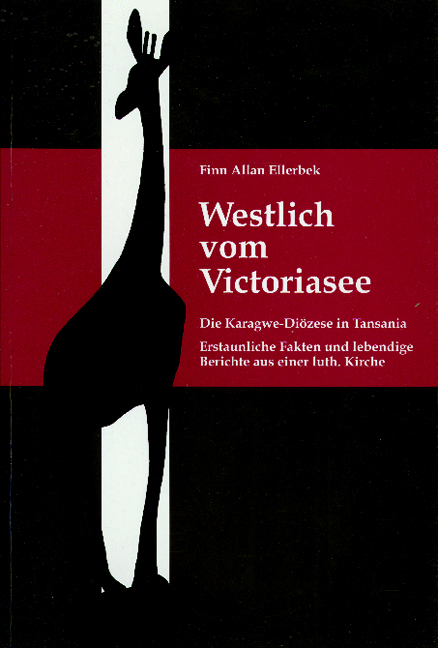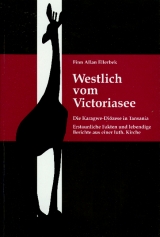Westlich vom Victoriasee
Die Karagwe-Diözese in Tansania. Erstaunliche Fakten und lebendige Berichte aus einer lutherischen Kirche
Seiten
2000
VML Vlg Marie Leidorf (Verlag)
978-3-89646-019-6 (ISBN)
VML Vlg Marie Leidorf (Verlag)
978-3-89646-019-6 (ISBN)
- Titel ist leider vergriffen;
keine Neuauflage - Artikel merken
Die von dem dänischen Missionspastor Ellerbek verfaßte Geschichte der afrikanischen Partnerkirche des westfälischen Rahden erzählt von Stämmen im Nordwesten von Tansania und ihren Bräuchen, vom "göttlichen Königtum", der beginnenden Christianisierung, dem Wachstum von der Mission zur Kirche sowie dem Einfluß der Erweckungsbewegung in Ostafrika. Das Buch enthält Berichte über einzelne Christen, die am Anfang ihren Glauben gegen den Widerstand ihrer Landsleute bezeugten und oft bei geheimen Zusammenkünften verkündigten. Außerdem geht es um Missionare der damaligen Bethelmission, durch die das einheimische Christentum seit 1910 Unterstützung erhielt. Zwei Weltkriege führten zu einer Unterbrechung der Missionsarbeit, aber durch den Einsatz afrikanischer Christen nicht zu ihrem Abbruch. Vielmehr entstand jenseits des Viktoriasees eine selbständige lutherische Kirche, die 1979 geteilt wurde. Dabei bildete sich an den Grenzen zu Uganda und Ruanda die Karagwe-Diözese. Auch über ihre Arbeit und das Gemeindeleben bis heute berichtet Ellerbek in seinem von G. Lückemeier ins Deutsche übersetzten Buch. Dieses schließt mit einem Abkürzungsverzeichnis, einem Sachregister, einem Literaturverzeichnis sowie mit einem Anhang von statistischen Angaben und graphischen Darstellungen. Dieser enthält u.a. Tabellen zu Taufen, von Teilnehmern am Abendmahl, Aufkommen der Kollekten, Kirchengebäuden, einer Chronologie der Geschichte, neugegründeten und aufgelösten Gemeinden, einheimischen Pastoren und Missionaren, Häuptlingsbezirken sowie Kartenmaterial.
The history of the African twin church of Rahden [Westphalia], recorded by the Danish missionary pastor Ellerbek, tells us about the tribes of Northwest Tanzania and their customs, about "divine kingship", the beginning of Christianization, the growth of a mission into a church and about the impact of East African revivalism. The book includes reports about individual Christians who initially defended their faith against their fellow countrymen’s resistance and often preached it at secret assemblies. Also, the volume deals with the missionaries of what was then the Bethel mission, who had supported local Christianity since 1910. The two world wars led to an interruption of the missionary work, but – thanks to the commitment of African Christians – not to its final termination. Rather, beyond Lake Victoria, an autonomous Lutheran church emerged, which was split in 1979. During that process, the Karagwe diocese came into being at the borders to Uganda and Ruanda. In his report, translated into German by G. Lückemeier, Ellerbek gives an account of work and community life in Karagwe until the present day. The volume closes with a list of abbreviations, an index, a bibliography, as well as an appendix of statistical data and illustrations, which includes e.g. charts about christenings, receivers of the holy communion, the yield of collections, church buildings, a historical chronology, newly founded and dissolved congregations, local pastors and missionaries, the districts of local chiefs and maps.
The history of the African twin church of Rahden [Westphalia], recorded by the Danish missionary pastor Ellerbek, tells us about the tribes of Northwest Tanzania and their customs, about "divine kingship", the beginning of Christianization, the growth of a mission into a church and about the impact of East African revivalism. The book includes reports about individual Christians who initially defended their faith against their fellow countrymen’s resistance and often preached it at secret assemblies. Also, the volume deals with the missionaries of what was then the Bethel mission, who had supported local Christianity since 1910. The two world wars led to an interruption of the missionary work, but – thanks to the commitment of African Christians – not to its final termination. Rather, beyond Lake Victoria, an autonomous Lutheran church emerged, which was split in 1979. During that process, the Karagwe diocese came into being at the borders to Uganda and Ruanda. In his report, translated into German by G. Lückemeier, Ellerbek gives an account of work and community life in Karagwe until the present day. The volume closes with a list of abbreviations, an index, a bibliography, as well as an appendix of statistical data and illustrations, which includes e.g. charts about christenings, receivers of the holy communion, the yield of collections, church buildings, a historical chronology, newly founded and dissolved congregations, local pastors and missionaries, the districts of local chiefs and maps.
| Zusatzinfo | 28 Tab., 4 Ktn |
|---|---|
| Sprache | deutsch |
| Maße | 165 x 240 mm |
| Gewicht | 450 g |
| Einbandart | Paperback |
| Themenwelt | Sozialwissenschaften ► Ethnologie ► Völkerkunde (Naturvölker) |
| Schlagworte | Afrika • Erweckungsbewegung • Kirchengeschichte • Landesgeschichte • Mission • Tansania • Theologie |
| ISBN-10 | 3-89646-019-6 / 3896460196 |
| ISBN-13 | 978-3-89646-019-6 / 9783896460196 |
| Zustand | Neuware |
| Haben Sie eine Frage zum Produkt? |
Mehr entdecken
aus dem Bereich
aus dem Bereich
Schweden : Ambiguitäten verhandeln - Tolerieren als soziale und …
Buch | Softcover (2023)
Brill Schöningh (Verlag)
CHF 69,85
Buch | Softcover (2023)
transcript (Verlag)
CHF 75,60




